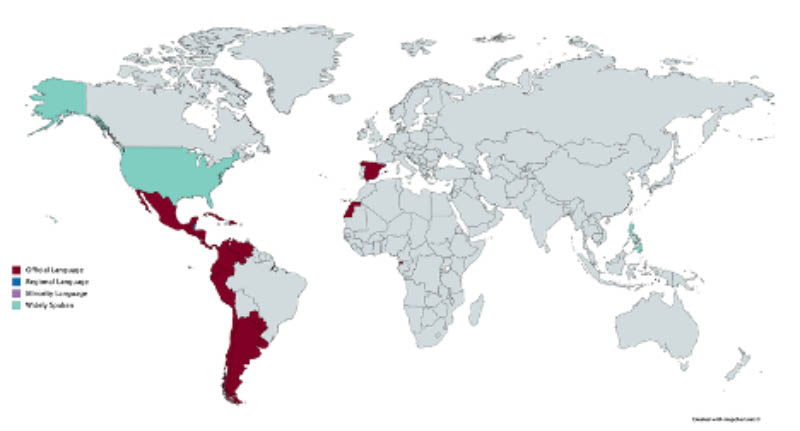B.A. (H) in Spanish/ Grado en Lengua Española
Spanish- a key to opportunities in Latin America & Europe
Learning Spanish opens up a multitude of scholarships, exchange programs, and career opportunities as it is a language that is spoken in more than 20 countries worldwide. Various scholarships are available, such as the Erasmus+ program, which facilitates study in Spanish-speaking countries, and the Spanish Government’s MAEC-AECID Scholarships for master’s degrees and research in Spain and Auxiliaresprogram for teaching English in schools and colleges. Many universities also offer cultural immersion programs through organizations like CIEE, provide students with valuable opportunities to study abroad and gain real-world experience. Many Spanish universities, such as Universidad Politécnica de Madrid (UPM) and Universidad de Navarra, also offer scholarships specifically for high-achieving international students in engineering and law, respectively. Career-wise, proficiency in Spanish enhances opportunities in education as language teachers, translators, or interpreters, as well as in international relations, where it is beneficial for roles in government and NGOs.
For Indian students proficient in Spanish, Latin America offers a variety of scholarships, exchange programs, and career opportunities that can significantly broaden their academic and professional horizons. Scholarships such as the Alianza del Pacífico Scholarships enable students to study in Pacific Alliance countries (Chile, Colombia, Mexico, and Peru), promoting educational and cultural integration. The MESCyT Scholarships in the Dominican Republic support international students, especially in fields like education, health sciences, and engineering, while PRONABEC Scholarships in Peru offer financial assistance across various levels of study. Mexico’s CONACYT Scholarships offer full funding for engineering studies, while Colombia’s COLFUTURO program provides partial loan-forgiveness funding for law and engineering students who work in Colombia after graduation.The OAS Academic Scholarships (Organization of American States) also allow students from member countries, including India, to pursue undergraduate or graduate programs in Latin American institutions.


Programme Overview
The NEP 2020 seeks to transform education by aligning it with local, national, and international standards, aiming to reduce dropout rates and enhance attendance. Under this policy, students completing one, two, or three years of an undergraduate (UG) program can leverage their acquired skills for employment opportunities. To fulfil NEP objectives, the Board of Studies (BOS) at the School of Liberal Studies, KIIT DU, has crafted a Four-Year Undergraduate Degree Program (FYUP) structure. Specifically, the FYUP Spanish2025 course integrates English studies with a focus on soft skills and vocational training, while offering multiple entry and exit points, allowing students to graduate with a Certificate, Diploma, or Degree. For Spanish Literary Studies, the curriculum spans eight semesters, covering British, American, European, Indian, and New Literatures, with courses in literary studies, skill enhancement, and generic electives designed to boost employability. The syllabus emphasizes subject knowledge, critical thinking, leadership, creativity, and research skills necessary for the competitive 21st-century economy. In the final FYUP year, students focus on research, providing a foundation for pursuing a PhD after one year of master’s studies.

Official language in: Argentina, Chile, Colombia, Costa Rica, Cuba, Dominican Republic, Ecuador, El Salvador, Equatorial Guinea, Guatemala, Honduras, Mexico, Nicaragua, Panama, Paraguay, Peru, Sahrawi Arab Democratic Republic, Spain, Uruguay, Venezuela
Minority language in: Andorra
Regional language in: Belize
Widely spoken in: Philippines, United States
Programme Structure
| SEMESTER I | |||||||
| S.No. | Course Type | Course Name | Course Code | L-T-P | Credits | ||
| 1 | Major | Elementary Spanish Grammar-I | SP 11101 | 3-1-0 | 4 | ||
| 2 | Major | European History through Spanish Society & Culture-I | SP 10103 | 2-0-0 | 2 | ||
| 3 | Interdisciplinary
(any one) |
Languages | French-I | FR 11001 |
3-1-0 |
4 |
|
| German-I | GR 11001 | ||||||
| Japanese -I | JP 11001 | ||||||
| Chinese | CN 11001 | ||||||
| Korean | KO 11001 | ||||||
| English | IntroductiontoLanguage and Linguistics | LL11201 | |||||
| Sociology | InvitationtoSociology | SO11301 | |||||
| Psychology | FundamentalsofPsychology | PS11301 | |||||
| 5 | Multidisciplinary (any one) | Contemporary Spain & Latin America: Culture, Media & Society-I | SP 10105 | 3-0-0 | 3 | ||
| 6 | Ability Enhancement Course | Spanish Writing Skills-I | SP 10107 | 2-0-0 | 2 | ||
| 7 | Skill Enhancement Course | Oral Communicative Skills-I | SP 12109 | 2-0-1 | 3 | ||
| 8 | Value Added Course I |
Understanding India |
CV 10701 |
2-0-0 |
2 |
||
| Value Added Course II (any one) | Sports and Yoga | SY 18001 | 0-0-2 | 1 | |||
| TOTAL CREDITS | 20 | ||||||
| SEMESTER II | |||||||
| S.No | Course Type | Course Name | Course Code | L-T-P | Credits | ||
| 1 | Major | Spanish | Elementary Spanish Grammar-II | SP 11102 | 3-1-0 | 4 | |
| 2 | Major | Spanish | European History through Spanish Society & Culture-I | SP10104 | 2-0-0 | 2 | |
| 4 | Interdisciplinary
(any one) |
Languages | French-II | FR 11002 |
3-1-0 |
4 |
|
| German-II | GR 11002 | ||||||
| Japanese -II | JP 11002 | ||||||
| Chinese- II | CN 11002 | ||||||
| Korean-II | KO 11002 | ||||||
| English | Elements of Phonetics andPhonology | LL11202 | |||||
| Sociology | IndianSociety:Imagesand
Realities |
SO11302 | |||||
| Psychology | IndividualDifferences | PS11302 | |||||
| 5 | Multidisciplinary (any one) | Contemporary Spain & Latin America: Culture, Media & Society-II | SP 10106 | 3-0-0 | 3 | ||
| 6 | Ability Enhancement Course | Spanish Writing Skills-II | SP 10108 | 2-0-0 | 2 | ||
| 7 | Skill Enhancement course | Oral Communicative Skills-II | SP 12110 | 2-0-1 | 3 | ||
| 8 | Value Added Course | Environmental Studies | LS 11006 | 2-0-0 | 2 | ||
| TOTAL CREDITS | 20 | ||||||
EVALUATION SCHEME
The performance of the student will be assessed throughout the semester. Evaluation is based on Internal Assessment, Continuous Internal Assessments (CIA) and End-Semester Examination.

Overall Programme Structure As Per Fyup UGC NEP 2020
The UG program will consist of the following categories of courses and the minimum credit requirements for 3-year UG and 4-year UG (Honors) or UG (Honors with Research) programmes are given below (FYUP UGC NEP 2020, P. 19-20):
| Curriculum and Credit Framework for Undergraduate Programmes | |||
| Sl. No. | Broad Category of Course | Minimum Credit Requirement | |
| 3 Years UG | 4 Years UG | ||
| 1. | Major (Core) | 60 | 80 |
| 2. | Minor Stream (Core Course) | 24 | 32 |
| 3. | Multidisciplinary | 09 | 09 |
| 4. | Ability Enhancement Courses (AEC | 08 | 08 |
| 5. | Skill Enhancement Courses (SEC) | 09 | 09 |
| 6. | Value Added Courses common for all UG (VAC) | 06-08 | 06-08 |
| 7. | Summer Internship (SI) | 02-04 | 02-04 |
| 8. | *Research Project / Dissertation (R&D) | 12 | |
| 9. | Total | 120 | 160 |

